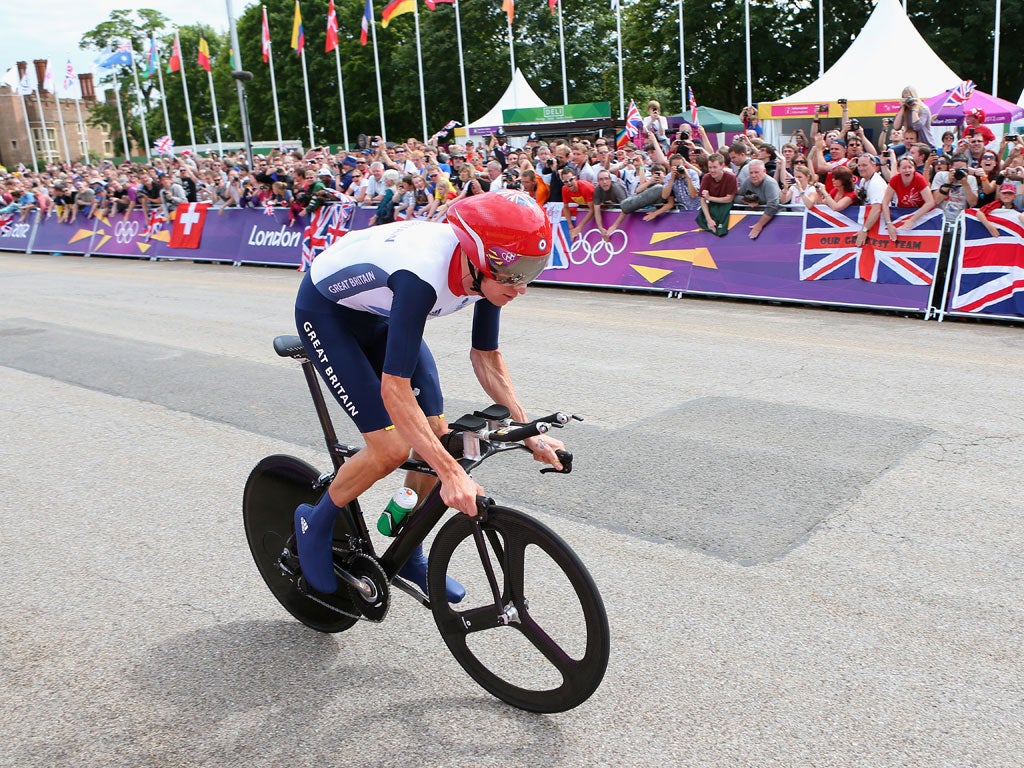Simon O'Hagan: Thanks for the Velodrome. Now how about safer cycling?
My Olympics: What the triumphs of Wiggins, Hoy, Trott and co could mean for the everyday cyclist

More than any other sport in which Team GB excelled at London 2012, success in cycling has the potential to translate into public policy that directly affects millions of people.
There's a limit to how many of us can feasibly take up sailing or rowing or taekwando or dressage, however inspired we might have been by the events of the past fortnight. But virtually anyone can ride a bike, and there's a role for cycling in virtually anyone's life. But will the Government now create the conditions that all but remove the excuses not to give cycling a go?
In my experience, fear is the No 1 reason most non-cyclists cite for their resistance to cycling. When the death of any cyclist makes news – and especially that of the cyclist who died during the Games under the wheels of a bus carrying members of the media – that is understandable. But perspective is always lost in such reports.
Death or serious injury occurs in an almost immeasurably tiny fraction of the millions of cycle journeys undertaken per year. So it was heartening to hear track gold medallist Laura Trott's response when she was asked last week if she thought cycling in London was dangerous. "No," she said, seemingly puzzled as to why anyone would even pose the question. Bradley Wiggins implied the same when he got caught up in the compulsory helmets debate a few days ago and made it clear that he wasn't calling for any such thing.
Of course we ordinary mortals can't ever hope to be able to ride a bike like Trott or Wiggins, but nonetheless it's vital to send out the message that cycling is something to be enthusiastically and safely embraced, not shied away from. And the quite astonishing run of British cycling triumphs in the past month – from Wiggins's Tour de France victory to his Olympic time-trial gold and on to Team GB's almost total domination of the velodrome – provides the momentum to turn Britain if not into a nation of cyclists then at least into a nation where cyclists are regarded as the norm, not eccentric risk-takers who invariably bring mishap on themselves and whose needs are secondary to those of other road-users.
Much is still to be done if – as one newspaper editorial argued over the weekend – cycling is to replace football as our national sport. In the past decade, London has shown the way with a huge upsurge in commuter cycling going hand in hand with improved infrastructure and the success of the "Boris bike" hire scheme.
Other cities have likewise come on leaps and bounds in their cycling provision, but we remain a long way off a country such as The Netherlands, where cycling is woven into the fabric of everyday life, cycling takes precedence over motorised transport, and there are as many bikes (17 million) as there are people.
That Boris Johnson is himself an inveterate commuter cyclist may be London's best hope of becoming a truly cycle-friendly city. Already the Mayor has seized the moment by announcing a two-day cycling festival that will take over the capital and beyond for a weekend in August 2013. Then again perhaps it is only when such exceptional treatment is regarded as redundant that we will know that cycling's "legacy" is secure.
For now, the sport – and the recreation – of cycling is, as it were, riding high and finding it all a bit strange. Is it really true – as the leading cycling coach Lee Povey told the Today programme last week, that motorists are giving us more space on the road and showing us more respect?
I think there's a danger of taking a rose-tinted a view of cycling's new-found acceptance, and I say that in part because the conduct of too many cyclists themselves leaves so much to be desired. Safety campaigns are a vital component of the cycling resurgence, but with the privileges that anyone who rides a bike should be afforded comes responsibility.
The great thing about the past fortnight is that those privileges are surely now unarguable.
Join our commenting forum
Join thought-provoking conversations, follow other Independent readers and see their replies
0Comments